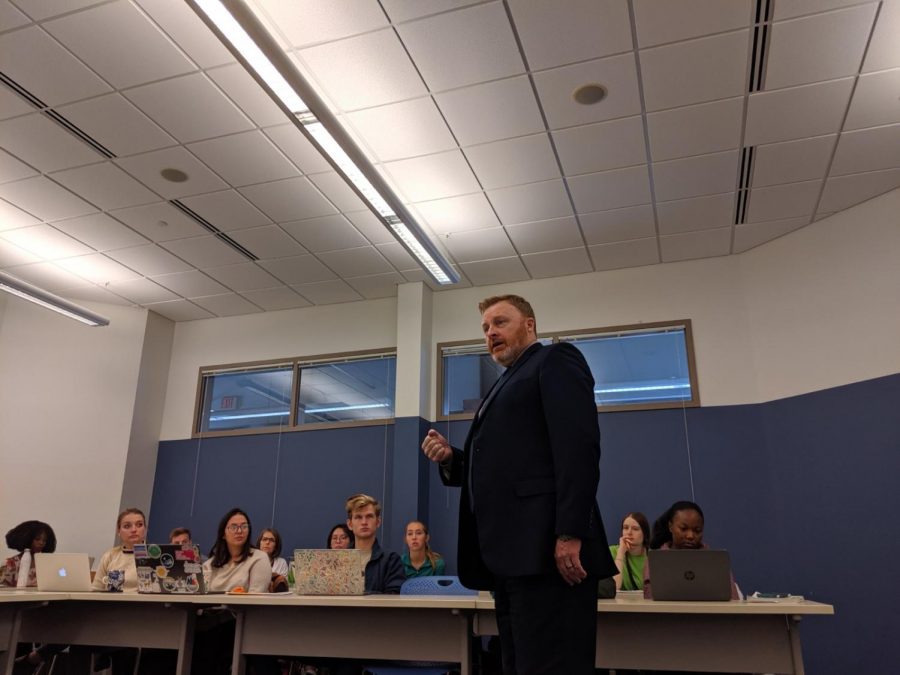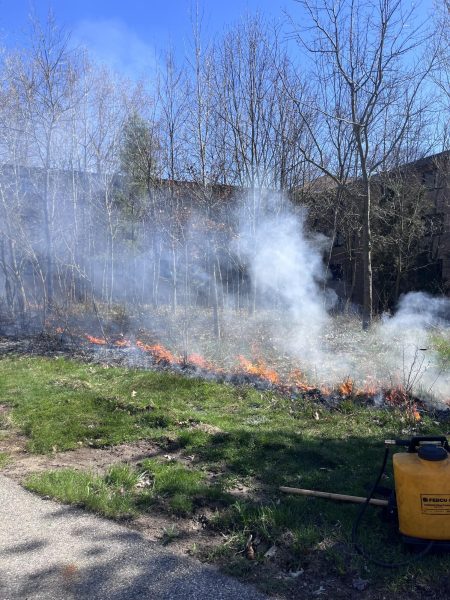The administration of education: interim superintendent of GRPS lectures in Calvin class
Ron Gorman is a part of a lecture series by POLS 209 class.
Dr. Ron Gorman, interim superintendent of Grand Rapids Public Schools, spoke Friday at Calvin about his experience in administration within the public school system. Gorman has years of experience in public education, working his way up from his position as a second grade teacher in 1998 to his current job as the head of the Grand Rapids school district.
Gorman spoke about some of the difficulties and successes of his work, including the complications of being the sole employee under a nine-person board. He said the key to working with a board is informing them of every major decision and incident and always being honest about his shortcomings. He noted that he’s been very blessed to work under a good board of education.
In addition to the complications of working under a board, Gorman must oversee a cabinet of 13 members, including executive directors, a CFO, a communications director and various other administrative personnel. He also deals with policymakers and new policies affecting the district.
The current program that he said is keeping him up at night regards third grade literacy rates. This piece of legislation requires third-graders to be reading at a third-grade level or be held back. About two-thirds of GRPS third-graders, Gorman says, would fail to meet this requirement. “Third-grade is a big indicator of success,” he said. “Kindergarten through third-grade you learn to read, and third grade on you read to learn.”
Gorman disagrees with the policy because of its failure to take into account the needs of the students. He says of the policy, “If I fail third-grade, I’ll come back to my same third grade class with the same teacher and the same mode of instruction.” Gorman sees his job as directing resources to students and teachers in need of them. Putting struggling kids back in unhelpful environments doesn’t do this well.
Gorman also stressed the importance of high schoolers passing every class, even if their grades aren’t the best. When students aren’t passing all their classes, it becomes much harder for them to graduate with a diploma. This in turn greatly decreases their opportunities for employment and higher education in later years. In the past seven years, however, the administration Gorman has served in and now leads has affected an increase in graduation rates from 44% to just over 70%. He hopes to see this number rise even higher in years to come.
An additional change that Gorman advocated for was a reduction in the number of school districts in the state of Michigan. According to Gorman there are currently 800 school districts in the state, but only 83 counties. He asserted that efficiency could be greatly increased with a reforming of district structures.
When relating his work to Calvin, Gorman referred to the number of current Calvin students placed at schools in Grand Rapids as student teachers and the amount of Calvin graduates employed by GRPS. He also stated that it is important for him to be able to inform his students about their options for higher education in the area.
Gorman’s own school experience was full of “troubling behaviors,” as he referred to them. In his talk, he mentioned that he was in and out of the principal’s office a lot in high school and didn’t focus on his schoolwork like he should have. By the time he began his senior year of high school, he had 10 of the 20 required credits to graduate. Gorman recalls wanting to finish for his mother’s sake, so he took on a variety of additional credits including night classes and driver’s education in order to graduate on time. In the end, he graduated with a full 20 credits, 10 of which had been earned in a single year.
Following graduation, Gorman attended Grand Rapids Community College. He left to join the US Army Reserves and went on to serve a total of eight years. After transferring to Aquinas College, he finished his Bachelor’s of Arts with minors in English, physical education and reading. Gorman also holds an MA in education leadership from Michigan State University and a PhD in educational leadership from Western Michigan University.
After graduating from Aquinas, Gorman says he was lucky to find a position in the same school system that he had student-taught in. He began his job as a second-grade teacher in January of 1998 and worked his way up in grade level, teaching fourth grade, sixth grade, and eventually becoming a middle school English teacher. At this point in his career, he switched over to work in administration.
Initially an athletic director, he went on to serve as a K-8 principal, high school principal, and eventually (after various other administrative positions) the assistant superintendent for the district. When the district board of education was unable to find a suitable successor for former superintendent Teresa Weatherall Neal, Gorman was asked to take the job. He was appointed to his current position on July 1, 2019.
This presentation came as part of The Henry Series in Public and Nonprofit Administration — a lecture series held in POLS 209, a political science course on the topic of public and nonprofit administration. This week’s presenter will be Michelle Van Dyke, president and CEO of Heart of West Michigan United Way, at 10:30 a.m. on Friday, Nov. 22 in DC 170.







